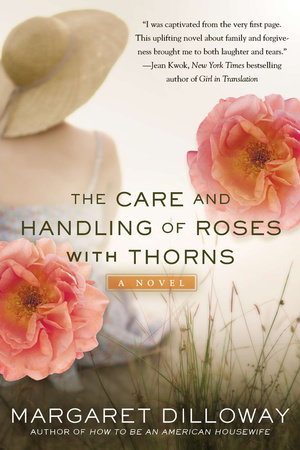READERS GUIDE
Questions and Topics for Discussion
INTRODUCTION
Thirty-six-year-old Gal Garner lives a regimented life. Her job teaching biology and her struggle with kidney disease keep her toggling between the high school, the hospital, and her home on a strict schedule.
Only at home, in her garden, does Gal come alive. It’s here that she experiments with Hulthemia roses, painstakingly cross-pollinating various specimens in the hopes of creating a brand-new variation of spectacular beauty. But even her passion has a highly structured goal: Gal wants to win Queen of Show in a major competition and bring that rose to market.
Then one afternoon Gal’s teenaged niece Riley, the daughter of her estranged sister, arrives. Unannounced. Neither one of them will ever be the same.
Filled with gorgeous details of the art of rose breeding, The Care and Handling of Roses with Thorns is a testament to the redemptive power of love.
ABOUT MARGARET DILLOWAYMargaret Dilloway was inspired by her Japanese mother’s experiences when she wrote this novel, and especially by a book her father had given to her mother called The American Way of Housekeeping. Dilloway lives in Hawaii with her husband and their three young children.
DISCUSSION QUESTIONSConsider the title of the book —what multiple meanings might it convey?In the early chapters, as we’re getting to know Gal as a character, what is your opinion of her? Does her struggle with kidney disease affect your perception of her character?Gal often views the world in black-and-white, and is inclined to stick to rules in the name of order and fairness. But at times, other adults in the story question or undermine her decisions, believing that individual circumstances merit a special response. Whom did you agree with during these conflicts? Do you see rules more as guidelines that should be flexible, or do exceptions make rules meaningless?The book highlights the complex and fraught system of organ donation, where in the face of a limited supply of organs, potential recipients must be ranked according to criteria that may not always seem fair . . . and this ranking can mean the difference between life and death. Do you agree with Gal’s implication that she’s more deserving of a kidney than Mark? What criteria would you take into account if you were doing the ranking?Riley comes to live with Gal at a fragile time during her teenage years, when she’s still trying to identify interests, solidify skills, and find her passions. How does living with Gal help her grow in these respects? Which other adults and peers also influence her development?Irresponsible, flaky Becky is an interesting foil to Gal, who is rigidly consistent in both her outlook and actions. Did your opinion of Becky change over the course of the novel? Do you sympathize at all with the struggles she faces and the choices she makes?As we learn in the book, rose breeding and cultivation is both a competitive endeavor that can lead to financial gain and a collegial undertaking in which fellow hobbyists share tips and information for mutual benefit. How do Gal and the other breeders handle the fine line between sharing and competing? Do you think Gal’s anger toward Byron was justified?In what ways does Gal become transformed by the end of the story, as a teacher, sister, friend, and stand-in parent?

